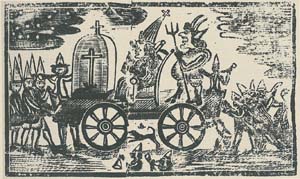The End of Pope Night in Boston
 As I’ve discussed under the label of Pope Night, the 5th of November was a big holiday in colonial Boston. That was when Boston’s young men and teen-aged boys showed their loyalty to Britain by parading through the streets with effigies of the Pope and the Devil, hanging the enemies of the year in effigy, and brawling after sundown.
As I’ve discussed under the label of Pope Night, the 5th of November was a big holiday in colonial Boston. That was when Boston’s young men and teen-aged boys showed their loyalty to Britain by parading through the streets with effigies of the Pope and the Devil, hanging the enemies of the year in effigy, and brawling after sundown.
That anti-Catholic pageant wasn’t any trouble until American Patriots started to seek to support of Catholics. One of the first people to recognize the potential problem was Gen. George Washington, who on 5 Nov 1775 chided his officers and troops for considering “that ridiculous and childish Custom of burning the Effigy of the pope.” At the time, Gen. Richard Montgomery and Col. Benedict Arnold were hoping to win over the French Catholics of Canada.
But that invasion fell apart, and by November 1776 Boston’s youth went back to their traditional Pope Night celebrations. Then in early 1778 the new U.S. of A.’s diplomats spoiled the fun by convincing the French government to enter the war. The French navy arrived off New England’s coast in the middle of the year. So suddenly Bostonians were supposed to be nice to Catholics again.
The joint American and French attempt to dislodge the British from Newport ended in failure, and then the fleet moved up to Boston. There was a lot of friction between those sailors and marines and the locals. As Christian McBurney describes in his recent Journal of the American Revolution article, “Why Did a Boston Mob Kill a French Officer?”, that conflict came to a head when, well, a Boston mob killed a French officer.
The local authorities quickly moved in to quell that fighting and repair relations with the French commanders. But the next 5th of November approached less than two months later. Those officials worried that Pope Night would rouse passions again. Therefore, they clamped down, at every level.
The Massachusetts Council, which was exercising executive power in the state in the absence of a governor, passed a resolve against Pope Night. Then the seven elected Boston selectmen, including John Scollay, Samuel Austin, and Harbottle Dorr, met on the 5th, and they invited the town’s magistrates in as well:
The Justices attended according to the invitation of the Selectmen to consult the best methods to prevent any Exhibitions this Evening agreable to a Resolve of the Council transmitted to the Selectmen, Yesterday.All those branches of government working together managed to suppress Pope Night at last. And it doesn’t seem to have come back in Boston again. Some of the rituals resurfaced around Christmas, others on Halloween. But the next time Boston newspapers reported on “Pope’s Day,” it was as a quaint pre-Revolutionary custom.

2 comments:
So right after the Compte d'Estaing and his crew graciously entertain Abigail Adams and her friends aboard his flagship anchored in Boston Harbor, we repay their hospitality by killing one of his officers?
Clearly our rocky relations with the French have a very long history.
Boston's elite seem to have smoothly cultivated relations with the French naval officers. Ordinary Bostonians and ordinary French sailors seem to have had a harder time getting over a century of enmity. At the height of the French Revolution, however, the frictions might have been quite different.
Post a Comment